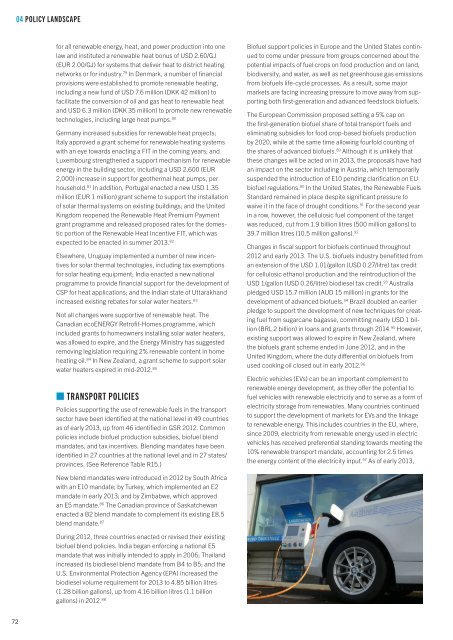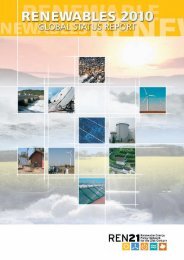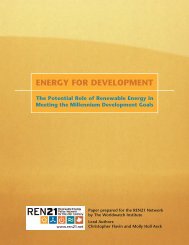RenewableS 2013 GlObal STaTUS RePORT - REN21
RenewableS 2013 GlObal STaTUS RePORT - REN21
RenewableS 2013 GlObal STaTUS RePORT - REN21
Create successful ePaper yourself
Turn your PDF publications into a flip-book with our unique Google optimized e-Paper software.
04 POLICY LANDSCAPE<br />
for all renewable energy, heat, and power production into one<br />
law and instituted a renewable heat bonus of USD 2.60/GJ<br />
(EUR 2.00/GJ) for systems that deliver heat to district heating<br />
networks or for industry. 79 In Denmark, a number of financial<br />
provisions were established to promote renewable heating,<br />
including a new fund of USD 7.6 million (DKK 42 million) to<br />
facilitate the conversion of oil and gas heat to renewable heat<br />
and USD 6.3 million (DKK 35 million) to promote new renewable<br />
technologies, including large heat pumps. 80<br />
Germany increased subsidies for renewable heat projects;<br />
Italy approved a grant scheme for renewable heating systems<br />
with an eye towards enacting a FIT in the coming years; and<br />
Luxembourg strengthened a support mechanism for renewable<br />
energy in the building sector, including a USD 2,600 (EUR<br />
2,000) increase in support for geothermal heat pumps, per<br />
household. 81 In addition, Portugal enacted a new USD 1.35<br />
million (EUR 1 million) grant scheme to support the installation<br />
of solar thermal systems on existing buildings; and the United<br />
Kingdom reopened the Renewable Heat Premium Payment<br />
grant programme and released proposed rates for the domestic<br />
portion of the Renewable Heat Incentive FIT, which was<br />
expected to be enacted in summer <strong>2013</strong>. 82<br />
Elsewhere, Uruguay implemented a number of new incentives<br />
for solar thermal technologies, including tax exemptions<br />
for solar heating equipment; India enacted a new national<br />
programme to provide financial support for the development of<br />
CSP for heat applications; and the Indian state of Uttarakhand<br />
increased existing rebates for solar water heaters. 83<br />
Not all changes were supportive of renewable heat. The<br />
Canadian ecoENERGY Retrofit-Homes programme, which<br />
included grants to homeowners installing solar water heaters,<br />
was allowed to expire, and the Energy Ministry has suggested<br />
removing legislation requiring 2% renewable content in home<br />
heating oil. 84 In New Zealand, a grant scheme to support solar<br />
water heaters expired in mid-2012. 85<br />
■■Transport Policies<br />
Policies supporting the use of renewable fuels in the transport<br />
sector have been identified at the national level in 49 countries<br />
as of early <strong>2013</strong>, up from 46 identified in GSR 2012. Common<br />
policies include biofuel production subsidies, biofuel blend<br />
mandates, and tax incentives. Blending mandates have been<br />
identified in 27 countries at the national level and in 27 states/<br />
provinces. (See Reference Table R15.)<br />
Biofuel support policies in Europe and the United States continued<br />
to come under pressure from groups concerned about the<br />
potential impacts of fuel crops on food production and on land,<br />
biodiversity, and water, as well as net greenhouse gas emissions<br />
from biofuels life-cycle processes. As a result, some major<br />
markets are facing increasing pressure to move away from supporting<br />
both first-generation and advanced feedstock biofuels.<br />
The European Commission proposed setting a 5% cap on<br />
the first-generation biofuel share of total transport fuels and<br />
eliminating subsidies for food crop-based biofuels production<br />
by 2020, while at the same time allowing fourfold counting of<br />
the shares of advanced biofuels. 89 Although it is unlikely that<br />
these changes will be acted on in <strong>2013</strong>, the proposals have had<br />
an impact on the sector including in Austria, which temporarily<br />
suspended the introduction of E10 pending clarification on EU<br />
biofuel regulations. 90 In the United States, the Renewable Fuels<br />
Standard remained in place despite significant pressure to<br />
waive it in the face of drought conditions. 91 For the second year<br />
in a row, however, the cellulosic fuel component of the target<br />
was reduced, cut from 1.9 billion litres (500 million gallons) to<br />
39.7 million litres (10.5 million gallons). 92<br />
Changes in fiscal support for biofuels continued throughout<br />
2012 and early <strong>2013</strong>. The U.S. biofuels industry benefitted from<br />
an extension of the USD 1.01/gallon (USD 0.27/litre) tax credit<br />
for cellulosic ethanol production and the reintroduction of the<br />
USD 1/gallon (USD 0.26/litre) biodiesel tax credit. 93 Australia<br />
pledged USD 15.7 million (AUD 15 million) in grants for the<br />
development of advanced biofuels. 94 Brazil doubled an earlier<br />
pledge to support the development of new techniques for creating<br />
fuel from sugarcane bagasse, committing nearly USD 1 billion<br />
(BRL 2 billion) in loans and grants through 2014. 95 However,<br />
existing support was allowed to expire in New Zealand, where<br />
the biofuels grant scheme ended in June 2012, and in the<br />
United Kingdom, where the duty differential on biofuels from<br />
used cooking oil closed out in early 2012. 96<br />
Electric vehicles (EVs) can be an important complement to<br />
renewable energy development, as they offer the potential to<br />
fuel vehicles with renewable electricity and to serve as a form of<br />
electricity storage from renewables. Many countries continued<br />
to support the development of markets for EVs and the linkage<br />
to renewable energy. This includes countries in the EU, where,<br />
since 2009, electricity from renewable energy used in electric<br />
vehicles has received preferential standing towards meeting the<br />
10% renewable transport mandate, accounting for 2.5 times<br />
the energy content of the electricity input. 97 As of early <strong>2013</strong>,<br />
New blend mandates were introduced in 2012 by South Africa<br />
with an E10 mandate; by Turkey, which implemented an E2<br />
mandate in early <strong>2013</strong>; and by Zimbabwe, which approved<br />
an E5 mandate. 86 The Canadian province of Saskatchewan<br />
enacted a B2 blend mandate to complement its existing E8.5<br />
blend mandate. 87<br />
During 2012, three countries enacted or revised their existing<br />
biofuel blend policies. India began enforcing a national E5<br />
mandate that was initially intended to apply in 2006; Thailand<br />
increased its biodiesel blend mandate from B4 to B5; and the<br />
U.S. Environmental Protection Agency (EPA) increased the<br />
biodiesel volume requirement for <strong>2013</strong> to 4.85 billion litres<br />
(1.28 billion gallons), up from 4.16 billion litres (1.1 billion<br />
gallons) in 2012. 88<br />
72




